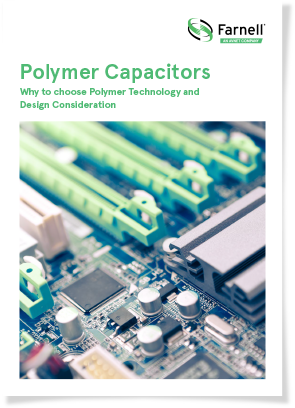Save space, increase performance, optimise cost
Have you thought of polymer capacitors?
Polymer capacitors meet the needs for high reliability, long life, stable performance, low ESR and low cost in a number of markets; such as enterprise, commercial, consumer, medical, aerospace, and now automotive as well.
They can provide a viable alternative for various designs currently using MLCCs, and can even provide direct drop-in replacements for low capacitance, non AEC-Q200 compliant designs. The potential cost and space saving when comparing single polymer capacitors to an equivalent of multiple MLCCs can make a big different in designing PCBs.
Benefits of polymer technology
The rise of popularity doesn't come by surprise as you see the extensive list of benefits for choosing Polymer capacitors over its competitors. They offer high capacitance in small packages, long life, high reliability, and many more desirable electrical characteristics including:
High frequency performance, Low ESR
High ripple current capability
Stable operation, no dependence on temperature & bias voltage
Wide operating temperature range
Acoustic noise elimination
Higher reliability & safety than general tantalum electrolytic capacitors
Space-saving & cost-saving on parts, reducing the production steps
Longer predictable lifetimes
With higher ripple current, stable ESR and capacitance across broad temperature and frequency spectrum, Polymer capacitors are a great alternative to MLCCs as you can see in the comparison table below:
| Capacity | Temp characteristic | DC bias characteristic | Voltage range | Size | ESR | Ripple | |
|---|---|---|---|---|---|---|---|
| Hybrid Polymer | |||||||
| Aluminium Polymer | |||||||
| Aluminium Multilayer | |||||||
| Tantalum Polymer | |||||||
| MLCC |
Register to download our exclusive article
Download our technical article today and learn more about the benefits of polymer technology.
Polymer is a conductive solid electrolyte and has unique characteristics like high breakdown strength and ease of processing. They are low-cost and able to overcome many problems that occur with traditional materials like ceramic and metal. This article explores why we choose polymer for capacitors and its design considerations.
Polymer capacitor types
Choose from a wide range of polymer capacitor types

Polymer Tantalum capacitors
- Small, large capacity, and low ESR capacitors,
- For customers who are concerned about downsizing and space-saving,
- Large capacity but space-saving (rating of 35V max.)

Polymer Aluminium capacitors
- High ripple, high pressure resistance, and low ESR capacitors,
- High ripple current (up to 7.5 A),
- Cover up to high withstand voltage of 100 V

Polymer Hybrid capacitors
- Highly-reliable and high withstand voltage, low ESR capacitors,
- On-vehicle quality and high reliability,
- Cover up to high withstand voltage of 80 V
Featured products
Browse our featured products


A720 AO-CAP® Series Polymer Aluminum Capacitors with very low ESR and improved capacitance retention at a high frequency.


KO-CAP Tantalum Polymer Capacitors combine low ESR, high capacitance and volumetric efficiency into a single surface mount package.


Conductive Polymer Aluminium Capacitors with low impedence and ESR, high ripple current, voltage & temperature.


TCJ series Surface Mount Polymer Capacitor with highest rated Voltage polymers up to 125°C and low ESR.


TCB series Conductive Polymer - COTS-Plus with very low ESR with stable, high-frequency CAP retention & longer life performance.
Resources
Useful resources to learn further
















